Interview: Oh My God It’s Kevin Morby!
31-year-old Kevin Morby has just released his 5th solo album, Oh My God.
And yes, the album’s title does indeed reflect the religious themes tucked inside the album’s 14 songs.
13th Floor’s Marty Duda tracked down Kevin Morby and found him in America’s heartland, which can be a dangerous place when you bring up religion and politics.
So, is he taking his life in his hands, or preaching to the converted? Listen to, or read the interview and find out!
Click here to listen to the interview with Kevin Morby:
Or, read a transcription of the interview here:
MD: Touring this album in the States, how has it gone, so far?
KM: Really amazing, really, really great. You know, I’ve been fortunate that every time I do a… a tour, or a new record, I say it’s my favourite one yet, and, I still – I’m feeling that one on this one as well. It’s been my favourite shows – and they’ve been our biggest shows too. Everything’s grown a little bit, more each time, and that continues to happen as well. So it’s been fun, we’ve been playing in front of significantly bigger stages, and rooms than we played in the past, which has been… a really cool experience, and I’ve got this big band with me, It’s like an eight-piece band, and so we’re getting kinda to perform songs in ways I’ve never heard them before. It’s been really great.
MD: Oh, that’s pretty interesting, because I mean, the album itself is fairly sparsely produced. So, what kind of configuration are you touring with?
KM: There’s a saxophone player, there’s another guitarist, there’s a bass player and drums, and there’s two backup singers and a keyboard player.
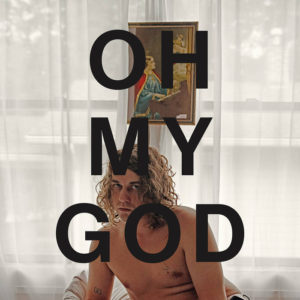 MD: Very cool. And I assume you’re doing some of your older stuff as well as things from Oh, My God. Do you kind of make the older stuff fit in with what the new stuff sounds like? Or are you kind of, going back and forth between what you’ve done before and this?
MD: Very cool. And I assume you’re doing some of your older stuff as well as things from Oh, My God. Do you kind of make the older stuff fit in with what the new stuff sounds like? Or are you kind of, going back and forth between what you’ve done before and this?
KM: Kind of going back and forth. We’ve been breaking up the set between two different sets. We’ve been doing a set of all new stuff – we basically play the record in full, then we take a little break, and then we play the old hits.
MD: Is that just because of the nature of the new record?
KM: Yeah. I think so. Y’know… we kinda make that the focal point, the stage has been decorated like we’re… like a sky, or like a cloudscape, like, we’re standing above these clouds, and… I don’t know, you know, we kinda make it all about the record, but then we kinda break down the fourth wall, about an hour into the show, and we play some songs that the crowd wants to hear from the old albums.
MD: Right. And did you have any trepidation about taking this on the road in the States, given the fact that it’s a kind of a religiously themed record?
KM: No, not at all, you know. I’ve had a lot of people come up to me and tell me, you know, that it’s – in Denver a guy came up to me and he told me, you know, I was raised in the Catholic Church, and I’ve always, I’ve had such a… I was part of it for a long time, I believed it for so long , and then I really railed against it, but your album has really been good for me, to really have a sort of a secular religious record, something that’s… it’s not on either side of the line. It’s just kind of, you know, using its imagery and vocabulary to tell a story. And he was saying that it kind of made it palatable for him again. Which I thought was interesting, and you know I liked that I could kind of provide that for somebody, and… I don’t know. I don’t think… it’s not overtly a religious record. It is, in its way, but it’s not actually telling anybody to do anything, so. I think that people have accepted it really well.
MD: One thing that people don’t like is being told what to do, as far as religion goes. So, that’s probably a wise move.
KM: Yes. Yes. Christi— pushy Americans.
MD: So, if that’s the case, what idea did you have in mind when you made the album with… what kind of idea did you have in mind of what you wanted to accomplish with these songs, then?
KM: Well, you know, it’s always been a part of my songwriting style to reference and use religious imagery. And I saw this as a way to kind of really follow that path, you know. But with a sort of overall mission statement that this isn’t an album telling you to worship anything or worship any certain god or anything. It’s just – it’s existing within those original boundaries – and telling a story. It’s like any other concept record, I suppose. You’re gonna tell a concept record about, I don’t know, about fishing, then, you know, it opens up this whole world of lingo, about fishing, you know?
MD: Yeah. Right.
KM: And I did a similar thing here, if that makes sense. But I did want to create something spiritual, but I think all music is sorta spiritual in its ways, and I really wanted to shine a light on that.
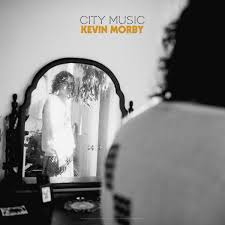 MD: Yeah. And sound-wise… it’s very different sounding than your previous album, City Music. Were you intending that when you were writing the songs? Did you have this different sound in mind, or did that develop as the production occurred?
MD: Yeah. And sound-wise… it’s very different sounding than your previous album, City Music. Were you intending that when you were writing the songs? Did you have this different sound in mind, or did that develop as the production occurred?
KM: It kind of developed as the production occurred. When Sam Cohen and I – he produced the record – when we got together, we didn’t know exactly what we wanted to do, and we got into the studio and… we kinda did what 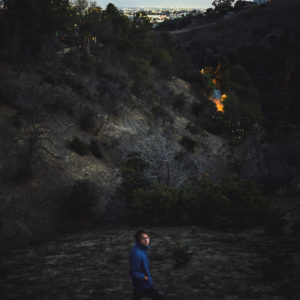 we did on Singing Saw – he produced that album as well. I came in with a guitar, we kind of assembled a band behind me, and what we did, we liked, but it felt like we were kind of doing the same thing twice. So, Sam was kinda the first person to propose that I put down the guitar, and focus more on being the singer, and we kinda changed the sonic landscape to… something more – I mean, given the subject matter and stuff, being sort of a religious or spiritual – kind of take it to something a little bit more minimal and break the songs down to their parts.
we did on Singing Saw – he produced that album as well. I came in with a guitar, we kind of assembled a band behind me, and what we did, we liked, but it felt like we were kind of doing the same thing twice. So, Sam was kinda the first person to propose that I put down the guitar, and focus more on being the singer, and we kinda changed the sonic landscape to… something more – I mean, given the subject matter and stuff, being sort of a religious or spiritual – kind of take it to something a little bit more minimal and break the songs down to their parts.
MD: And were you concerned – I guess what I’m trying to get at is that your songwriting method… were you concerned that that would hold up with that kind of production approach in mind? As opposed to the way you worked before?
KM: Yeah. Once we stumbled on to what the production sound was gonna be, I didn’t have the whole record written at the time, so when I went to go finish the album and write the album, that was definitely on my mind. You know, I think the biggest thing here on this record was me being a singer more than anything else. Or, it being more about the vocals and the lyrics, and having that really up front and center. So I was focused on that a lot more on that than on previous records. Where in something like City Music, you know, is a very guitar-based record. It was sort of about the energy, and feeling sort of rock ‘n’ roll, and with this, it was more about the poetry.
MD: Right. And you had a few guests, sitting in with you on the record, like Mary Lattimore and Elvis Perkins. How did those folks come to be involved, with the record?
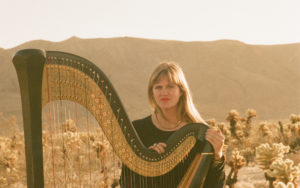 KM: Well, Mary’s a good friend of mine, we’ve been on some touring together, where she’s supported me on some tours, and when she would do those we would, we would play some songs together. So she’s just a friend, and I obviously did want her harp on this record because of how heavenly she sounds, and…. she was the obvious first choice. Yeah. And she was the obvious first choice, so, luckily she was able to do it. She tours more than anyone I know. So. Luckily I caught her at a time when she could…
KM: Well, Mary’s a good friend of mine, we’ve been on some touring together, where she’s supported me on some tours, and when she would do those we would, we would play some songs together. So she’s just a friend, and I obviously did want her harp on this record because of how heavenly she sounds, and…. she was the obvious first choice. Yeah. And she was the obvious first choice, so, luckily she was able to do it. She tours more than anyone I know. So. Luckily I caught her at a time when she could…
MD: Yeah, she’s going to be here in Auckland in a couple of weeks, I think.
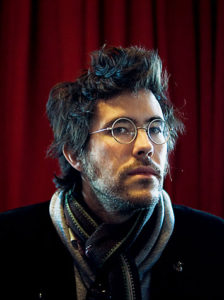 KM: Oh, amazing. Yeah. She’s a true road dog. And then who was the other guest – oh, Elvis! Oh, Elvis was actually working on another project with Sam. And… I wasn’t even in the studio for that. I told Sam that I wanted to do this thing, and Elvis is a good friend, and I think Sam said, “Oh, you know, Elvis is really good at that.” And basically what Elvis did was that he made white noise. He made a keyboard sound like a storm, and so he just whipped that up in the studio and I wasn’t even there. But it’s beautiful.
KM: Oh, amazing. Yeah. She’s a true road dog. And then who was the other guest – oh, Elvis! Oh, Elvis was actually working on another project with Sam. And… I wasn’t even in the studio for that. I told Sam that I wanted to do this thing, and Elvis is a good friend, and I think Sam said, “Oh, you know, Elvis is really good at that.” And basically what Elvis did was that he made white noise. He made a keyboard sound like a storm, and so he just whipped that up in the studio and I wasn’t even there. But it’s beautiful.
MD: Oh. And for you, you’ve kind of lived with the album, and obviously, it’s been finished for longer than that as far as you’re concerned. Do you look back on it now, are there favourite moments on the record? Are there moments that stand out for you? That maybe surprise you ?
KM: You know, the record was recorded in – yeah, for sure. You know, the record was recorded in a couple different parts, so. I love the moment where Sam and I realized that we were gonna take this turn, this sonic turn, with it, and that’s when – um, during the first week that we were recording it and we were trying to record the song Nothing Sacred/All Things Wild, and I went to go record it on the guitar, but then Sam was saying, “Oh, why don’t you just try and do it without a guitar, I’ll play keys – no, I’ll play organ, and you just sing, and Nick, how about instead of you playing the drums, you play the congas.” And the moment we started recording it, it kinda dawned on all of us, I think, oh wow, we’ve stepped into something new, and that was a big revelation and that’s, that’s a moment I miss a lot. And then we did a lot of the full-band stuff, where there’s full drums and guitars and stuff, we did in Woodstock, and that was a fun four days of recording, we were just up in this house in Woodstock and in the woods, away from everything. And that was a good time, it was a great time being in the studio for when Meg [Duffy] played guitar and Mary played harp, and you know, just watching my talented friends did their thing.
MD: So, when you were up in Woodstock, were you feeling like a Dylan and The Band vibe going on there?
KM: I guess so! It’s hard not to get away from that stuff, when you’re in Woodstock, because obviously it’s so… famous for that. Every little café you go into has some pictures of them, so… I guess you feel like that a little bit —
MD: Yeah, yeah, yeah. And uh – speaking of Dylan – Sorry, that last bit ended up garbled. Can you repeat yourself please?
KM: We feel like Dylan and The Band with iPhones.
MD: Speaking of Dylan, he obviously went through his religious phase for a couple of years. Did any of that have any effect on how you approached what you did?
KM: Definitely not. You know, what he did when he went through that phase was – I mean, he would give sermons and he believed in Christianity, and he was trying to spread the Gospel and that’s not what I’m trying to do at all. I mean, I think there’s some… I, yeah. You know what? That era of him, I’ve never really gotten too into or anything. I think he’s a deep influence on other work, and the fact about someone like him, is he’s always singing about God. So I am influenced by some of his religious imagery, and stuff used in other work – but his religious phase, I’ve never been too into.
MD: Gotcha. And I was just reading an interview in The Guardian, I think it was, where it kinda referred to you as a “master songwriter”, and I’m wondering, just in general, your songwriting – how do you feel about it? Has it changed? Are you influenced, particularly, by anybody? How did you come about you know, realizing that you were indeed a songwriter, and you could do this thing?
KM: You know, I think, for so long, I wanted to be, but I felt like it wasn’t happening. In my teenage years, or my early 20s, and I would see people do it, and I would feel like they could do it better than me, I had some sort of feeling inside of me, that if I just kept doing it, if I could crack it open, it would all come flooding out. And I felt that sort of happened when in my early 20s when I was in a band called The Babies, and when I was in a band called Woods. I was very influenced by Jeremy Earl, the singer of Woods. I was living in a house with him, and playing bass in his band, and there was something about watching him work and how effortlessly it came to him, and how he just kinda breathes music, wore off on me somehow, and – I don’t know! – I just sort of started always having a guitar in my hands, just sort of always – always – just sort of making music in my life, and kinda once I did that, it started to come to me a bit more naturally.
And also, I think that when you just experience under your belt – when you tour a lot, and you’re just kind of in the environment, I’ve just always called it like throwing myself into the fire. When you throw yourself into the fire, you know – you’ll um… you’ll – you’ll learn it. It’s like the ten thousand hours theory, you know. You do anything long enough, you’ll start to become good at it, after a while.
MD: Sounds like good recommendation for up-and-coming songwriters who may be frustrated with how things are going, I guess. Cause I imagine that everybody’s going to go through that process. At some point or another.
KM: Yeah, for sure. I think it’s about doing it, you know. About making it your life.
MD: Right. Right. And so – do you consider yourself writing songs all the time, or do you kinda set aside a time to do that?
KM: Yeah, I write pretty impulsively. I write, kinda all the time. I’m always working on a handful of songs.
MD: And when you have time off, like – you’ve taken a week off between shows here in the tour. Is… are you taking time to just chill out, or are you rethinking how things are going, and retooling things?
KM: I’m always retooling things. Things are always on my mind with what you’d call my career. You know, I’m always thinking about the next step, or the next thing coming up, which, you know… I love. I don’t need to turn my brain off from all of it because it’s what I do. It’s what makes me happy, and it’s therapeutic for me. And I think it’s good for the human mind to always be mulling over what the next step is.
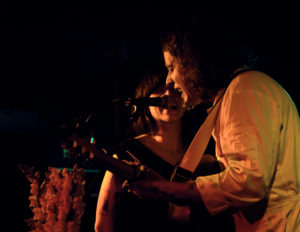 MD: Right. Now, speaking of next step – you were actually in Auckland, not that long ago, back in November, with Waxahatchee, I believe, right?
MD: Right. Now, speaking of next step – you were actually in Auckland, not that long ago, back in November, with Waxahatchee, I believe, right?
KM: Yes! Yes.
MD: So, how did that go, and are there plans to bring this tour back around these parts, anytime?
KM: It was amazing, I loved my show there. I would love to do this, in a world where I could afford to fly an eight-piece band to Auckland. I would love to come there, maybe with a smaller band, at some point, and I’m gonna absolutely try to come there on this cycle, but that show was amazing. You know, I do remember, that was the first show that I was so incredibly jet-lagged, that it felt like I had taken some sort of drugs. I just felt so crazy, out of my mind. But the show was really good.